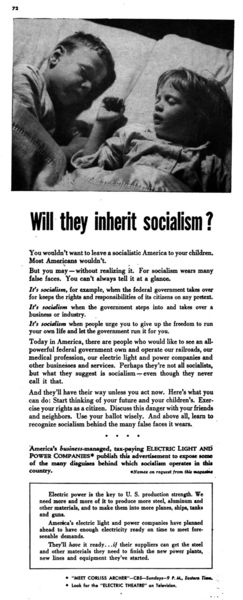Socialized Power For Our Children
 My first reaction was that this advertisement, published in a 1952 farming magazine, was steeped in anti-communist propaganda. After all, socialism and communism are terms arm-in-arm, almost interchangeable, depending on where they're used. The Union of Soviet Socialist Republics was the enemy, we had just defeated Germany's National Socialist party, so in 1952 socialism seemed to be America's greatest enemy.
My first reaction was that this advertisement, published in a 1952 farming magazine, was steeped in anti-communist propaganda. After all, socialism and communism are terms arm-in-arm, almost interchangeable, depending on where they're used. The Union of Soviet Socialist Republics was the enemy, we had just defeated Germany's National Socialist party, so in 1952 socialism seemed to be America's greatest enemy.The threat here turns out to be closer to home. Eisenhower, as I mentioned a couple days ago, was quite 'left' when it came to socialized and public works. Socialized power, or, rather, federally-funded power plants, was high on Eisenhower's 'to-do' list. Eisenhower didn't have some haughty Marxist ideals -- he had been a leader during WWII, and saw first-hand how a country's strong infrastructure kept it operating during adversity. Eisenhower's highway system is still the road upon which American commerce and communication rolls, and he thought having federally-controlled electricity would allow the country to weather problems by controlling the source. Private electricity companies, as you might gather, felt quite threatened by the possibility of their racket being leaned on by government influences. "Won't Someone Think of the Children?" the power companies cried, so soon forgetting how Roosevelt's REA program brought hot water and radio to the children of the farmers that bought this magazine. At least with REA, private companies got the money for the work -- turbines at Niagara was another thing altogether.
(click the image to read the content of the ad)
Labels: 1950s, 1952, eisenhower, propaganda, socialism










